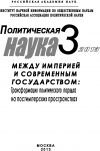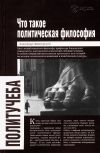Текст книги "Политический порядок в меняющихся обществах"

Автор книги: Самюэль Хантингтон
Жанр: Зарубежная образовательная литература, Наука и Образование
сообщить о неприемлемом содержимом
Текущая страница: 41 (всего у книги 42 страниц)
53 Gamal Abdel Nasser, Speeches Delivered in the Northern Region (February – March 1961), p. 88, цит. у Перлмуттера, гл. 6, с. 37.
54 Цит. в кн.: Brian Crazier, The Morning After (London, Methuen and Company, 1963), p. 73.
55 McAlister, p. 152.
56 См.: James Heaphey, «The Organization of Egypt: Inadequacies of a Nonpolitical Model for Nation-Building», World Politics, 18 (January 1966), 177–178.
57 Fred R. von der Mehden, «The Burmese Way to Socialism», Asian Survey, 3 (March 1963), 133. О HCA можно прочитать в статье: Richard Butwell, «The New Political Outlook in Burma», Far Eastern Survey, 29 (February 1960), 23–24.
58 См.: RJ.Vatikiotis, The Egyptian Army in Politics (Bloomington, Indiana University Press, 1961), p. 106, 284; New York Times, June 26,1964, p. 2; December 15,1963, p. 17.
59 Речь, произнесенная 9 апреля 1953 г.; цит. по кн. Ватикиотиса, с. 83.
60 Vatikiotis, р. 139.
61 См.: George Lenczowski, «Radical Regimes in Egypt, Syria and Iraq: Some Comparative Observations on Ideologies and Practices», Journal of Politics, 28 (February 1966), 51–52.
62 Washington Post, February 9,1964, p. A-17.
63 Heaphey, p. 193.
64 Halpern, Politics of Social Change, p. 286.
65 Vatikiotis, p. 72.
66 Ibid., p. 225.
67 The Economist (March 12,1960), p. 974, 977; цит. у Перлмуттера, гл. 6, с. 30, 31.
68 Текст меморандума см. в кн.: Karl von Vorys, Political Development in Pakistan (Princeton, Princeton University Press, 1965), p. 299 ff.
69 Цит. в кн.: Richard V. Weekes, Pakistan: Birth and Growth of a Muslim Nation (Princeton, D. Van Nostrand and Company, 1964), p. 118.
70 Von Vorys, p. 201.
71 Keith Callard, Pakistan: A Political Study (London, Allen and Unwin, 1957), p. 50, 52.
72 Цит. у Бориса, с. 206.
73 Mohammad Ayub Khan, Speeches and Statements, 2, 35, цит. у Бориса, с. 106.
74 Ibid., p. 256–257.
75 Mushtq Ahmad, Government and Politics in Pakistan (Karachi, Pakistan Publishing House, 1963), p.282.
76 Цит. в статье: Lucian Pye, «Party Systems and National Development in Asia», in Joseph LaPalombara and Myron Weiner, eds., Political Parties and Political Development (Princeton, Princeton University Press, 1966), p. 369.
77 Цит. в кн.: Irfan Orga, Phoenix Ascendant: The Rise of Modern Turkey (London, Robert Hale, 1958), p. 38.
78 Цит. встатье: DankwartA. Rustow, «The Army and the Founding of the Turkish Republic», World Politics, 11 (July 1959), 546.
79 Liewen, Arms and Politics, p. 119.
80 Jae Souk Sohn, «The Role of the Military in the Republic of Korea» (неопубликованная рукопись, сентябрь 1966), с. 7; Henderson, p. 185–188, 305–306.
5. Революция и политический порядок
1 Carl J. Friedrich, Man and His Government (New York, McGraw-Hill, 1963), p. 644.
2 Hanna Arendt, On Revolution (New York, Viking, 1963), p. 28.
3 Стефен Маршалл, 1641, цит. в кн.: Michael Waltzer, The Revolution of the Saints (Cambridge, Harvard University Press, 1965), p. XIV. В исследовании Уолцера убедительно показана модернизаторская, революционная природа пуританства.
4 George S. Pettee, The Process of Revolution (New York, Harper, 1938), p. 96.
5 Ibid., p. 100–101.
6 Crane Brinton, The Anatomy of Revolution (New York, Vintage, 1958).
7 Leon Trotsky, My Life (New York, Scribner's, 1930), p. 337; цит. в кн.: Merle Fainsod, How Russia is Ruled (Cambridge, Harvard University Press, 1953), p. 84. – Es schwindelt – это головокружительно (нем.)
8 Ср. Chalmers Johnson, Revolution and the Social System (Stanford, Hoover Institution, 1964), p. 3–22; Harry Eckstein, «Internal War: The Problem of Anticipation», in Ithiel de Sola Pool et al., Social Science Research and National Security (Washington, Smithsonian Institution, 1963), p. 116–118.
9 Pettee, p. 12, 100; Brinton, p. 100 ff.; Johnson, p. 5 ff.
10 R.R. Palmer, The Age of the Democratic Revolution, I, 484.
11 Barbara Ward, «The City May Be as Lethal as the Bomb», New York Times Magazine, April 19,1964, p. 22.
12 Ernest Halperin, «The Decline of Communism in Latin America», Atlantic Monthly, 215 (May 1965), 65.
13 Glaucio A.D. Soares, «The Political Sociology of Uneven Development in Brazil», in Irving L. Horovitz, ed., Revolution in Brazil (New York, Dutton, 1964), p. 191; Andrew Pearse, «Some Characteristics of Urbanization in the City of Rio de Janeiro», in Philip Hauser, ed., Urbanization in Latin America (Paris, UNESCO, 1961), p. 196.
14 Angus Campbell et al., The American Voter (New York, John Wiley, 1960), p. 209–210; Frank Bonilla, «Rio's Favelas», American Universities Field Stuff Report Service (East Coast South American Series, Vol. 8, No. 3, February 1,1961), 12; John R Harrison, «The Role of the Intellectual in Fomenting Change: the University», in John TePaskeand Sydney N. Fisher, eds., Explosive Forces in Latin America (Columbia, Ohio State University Press, 1964), p. 34; Daniel Goldrich, «Toward an Estimate of the Probability of Social Revolutions in Latin America: Some Orienting Concepts and a Case Study», Centennial Review, 6 (Summer 1962), 400. См. также: Daniel Goldrich, Raymond B. Pratt, and C. R. Schuller, «The Political Integration of Lower Class Urban Settlements in Chile and Peru: A Provisional Inquiry» (доклад на ежегодной встрече Американской политологической ассоциации, Нью-Йорк, 5-10 сентября 1966 г.).
15 Halperin, р. 66.
16 H.Rotondo, «Psychological and Mental Health Problems of Urbanization Based on Case Studies in Peru», in Hauser, p. 255.
17 Soares, p. 191–192; Alfred Stepan, «Political Development Theory: The Latin American Experience», Journal of International Affairs, 20 (1966), p. 229–231; Joseph A. Kahl, «Social Stratification and Values in Metropolis and Provinces: Brazil and Mexico», America Latina, 8 (Jan. – Mar. 1965), 33. Cf. John C. Leggett, «Uprootedness and Working-Class Consciousness», American Journal of Sociology, 68 (1963), 682 ff.
18 Weiner, The Politics of Scarcity, p. 205–206, и Weiner, «Urbanization and Political Protest», Civilisations, 17 (1967), p. 44–50.
19 Oscar Handlin, The Uprooted (Boston, Little Brown, 1951), p. 267; Will Herberg, Protestant-Catholic-Jew (Garden City, N.Y., Doubleday, 1956), p. 28–35; Marcus L. Hansen, The Immigrant in American History (Cambridge, Harvard University Press, 1940), p. 92–96.
20 Claude Brown, Testimony, Hearings on Federal Role in Urban Problems, U.S. Senate, Subcommittee on Executive Reorganization of the Committee on Government Operations, 89th Congress, 2d Session (1966), PartV, p. 1106; Philip Meyer, A Survey of Attitudes of Detroit Negroes After the Riot of 1967 (Detroit, Detroit Urban League and Detroit Free Press, 1967).
21 Kornhauser, The Politics of Mass Society, p. 150–151; курсив в оригинале.
22 См. George Е. Lichtblau, «The Politics of Trade Union Leadership in Southern Asia», World Politics, 7 (1954), p. 89–99; Arnold Zack, Labor Training in Developing Countries (New York, Praeger, 1964), p. 12; Bruce Millen, The Political Role of Labor in Developing Countries, p. 49–52; Robert J. Alexander, Organized Labor in Latin America (New York, Free Press, 1965), p. 13; Marshall R. Singer, The Emerging Elite (Cambridge, M.I.T. Press, 1964), p. 128–136.
23 Gaston V. Rimlinger, «The Legitimation of Protest: A Comparative Study in Labor History», Comparative Studies in Society and History, 2 (April 1960), p. 342–343.
24 Henry A. Landsberger, «The Labor Elite: Is It Revolutionary?» in Seymour Martin Upset and Aldo Solari, eds., Elites in Latin America (New York, Oxford University Press, 1967), p. 260.
25 Lichtblau, p. 100.
26 Lloyd Fallers, «Equality, Modernity, and Democracy in the New States», in Clifford Geertz, ed., Old Societies and New States (New York, The Free Press, 1963), p. 188. См. также замечание Теодора Дрейпера, что кубинские профсоюзы «сумели за многие годы добиться немалого числа уступок и привилегий, что превратило членов этих профсоюзов в сравнительно привилегированный класс». Castroism: Theory and Practice (New York, Praeger, 1965), p. 76–77.
27 Landsberger, p. 271.
28 Halpern, The Politics of Social Change in the Middle East and North Africa, p. 75; Draper, p. 79.
29 Bert F. Hoselitz and Myron Weiner, «Economic Development and Political Stability in India», Dissent, 8 (Spring 1961), 177; Benjamin B. Ringer and David L. Sills, «Political Extremists in Iran», Public Opinion Quarterly, 16 (1952–1953), p. 693–694.
30 Palmer, I, p. 483–484.
31 John Maynard, The Russian Peasant and Other Studies (London, Victor Gollancz, 1947), p. 74–75; Launcelot Owen, The Russian Peasant Movement, 1906–1917 (New York, Russell and Russell, 1963), p. 139. Мне также оказались очень полезными сведения по этим вопросам, содержащиеся в неопубликованной работе: Jo Clayre Marvin, «The Political Role of the Russian Peasantry, 1890–1921» (Cambridge, Mass., Harvard University, 1965).
32 Owen, p. 138; Ленин процитирован в кн.: William Henry Chamberlin, The Russian Revolution, 1917–1921 (New York, Macmillan, 1952), I, 294.
33 Mao Tse-Tung, «Report of an Investigation into the Peasant Movement in Hunan»; перепечатка в кн.: Stuart R. Schram, ed., The Political Thought of Mao Tse-Tung (New York, Praeger, 1963), p. 180–182,184; курсив в оригинале.
34 Celso Furtado, цит. в работе: Thomas F. Carrroll, «Land Reform as an Explosive Force in Latin America», in TePaske and Fisher, p. 119–120.
35 Paul Stirling, «Structural Changes in Middle East Society», in Philip W. Thayer, ed., Tensions in the Middle East (Baltimore, Johns Hopkins Press, 1958), p. 145. См. также работу: Douglas D. Crary, «The Villager», in S.N.Fisher, ed., Social Forces in the Middle East (Ithaca, Cornell University Press, 1955), p. 52. По этому вопросу мне была также полезна неопубликованная работа Стивена Дейла: «The Anatomy of La Miseria: A Critique of Banfield's Theory of the Moral Nature of Underdeveloped Societies» (Cambridge, Mass., Harvard University, 1966).
36 Celso Furtado; цит. в работе: Carroll, «Land Reform», p. 120; см. также: Royal Institute of International Affairs, Agrarian Reform in Latin America (London, Oxford University Press, 1962), p. 15.
37 Полезное обсуждение перспектив союза между университетскими интеллектуалами и городской беднотой см. в работе Харрисона «University», in TePaske and Fisher, p. 34–36.
38 См.: Edmundo Flores, Land Reform and the Alliance for Progress (Princeton, Center of International Studies, 1963), p. 13.
39 О Мексике см. в кн.: Henry Bamford Parker, A History of Mexico (rev. ed. Boston, Houghton Mifflin, 1950), p. 309. О Кубе см. в работе: Leland L. Johnson, «U.S. Business Interests in Cuba and the Rise of Castro», World Politics, 17 (April 1965), p. 440–459.
40 Palmer, 2, 4.
41 См.: Perlmutter, «Ambition and Attrition», Chap. 3, p. 10, 11; Chalmers Johnson, Peasant Nationalism and Communist Power (Stanford, Stanford University Press, 1962), p. 22–26; Richard Cottam, Nationalism in Iran (Pittsburg, University of Pittsburgh Press, 1964), p. 291.
42 Leon Trotsky, History of the Russian Revolution (New York, Simon and Schuster, 1932), p. 2, 46.
43 Edwin Reingold, Time, 84 (August 14,1964), 28.
44 Цит.: С.К. Макклэтчи (Washington Post, September 26,1965, p. E4).
45 См. блестящее истолкование этого феномена у Уолцера в кн.: Waltzer, Revolution of the Saints, passim.
46 Bertran deJouvenel, On Power (Boston, Beacon Press, 1962), p. 218.
47 Ibid.
48 См.: Howard F. Cline, The United States and Mexico (2nd ed. Cambridge, Harvard University Press, 1965), p. 52; Parkes, p. 308.
49 Robert E. Scott, Mexican Government in Transition (Urbana, University of Illinois Press, 1959), p. 96.
50 См.: Kalman Silvert, ed., Expectant Peoples (New York, Random House, 1963), p. 358–361.
51 Edwin Lieuwen, Arms and Politics in Latin America, p. 101.
52 Ласаро Карденас; цит. в кн.: Lieuwen, p. 114. См. выше, с. 256–257, о росте цивилизованности мексиканского политического руководства.
53 О Карденасе см. у Скотта, с. 127.
54 Gabriel A. Almond and Sidney Verba, The Civic Culture.
55 Sidney Verba and Gabriel A. Almond, «National Revolutions and Political Commitment», in Harry Eckstein, ed., Internal War (New York, The Free Press, 1964), p. 230; Almond and Verba, Civic Culture, p. 99, 219. Cp. Robert E. Scott, «Mexico: The Established Revolution», in Pye and Verba, eds., Political Culture and Political Development, p. 330–395.
56 Russell et al., World Handbook of Political and Social Indicators, p. 239; Cornelius H. Zontag, The Bolivian Economy, 1952–1965 (New York, Praeger, 1966), p. 144.
57 Richard Patch, «Bolivia: The Restrained Revolution», Annals, 334 (March 1961), p. 127.
58 De Jouvenel, p. 219.
59 О формах организации рабочих в Мексике и Боливии см. в кн.: Alexander, Organized Labor in Latin America, p. 102–110,197-198.
60 Richard W. Patch, «Bolivia: U.S. Assistance in a Revolutionary Setting», in Richard Adams, ed., Social Change in Latin America Today (New York, Vintage, 1960), p. 119–124.
61 Richard Weinert, «Bolivia's Shaky Truce», The New Leader, 48 (July 5,1965), p. 8.
62 The Daily Journal (Caracas), June 4,1965, p. 24.
63 Roy R. Rubottom, Jr., Assistant Secretary of State for Inter-American Affairs, Hearings on Mutual Security Act of1960, U.S. House of Representatives, Committee on Foreign Affairs, 86th Cong., 2nd Sess. (1960), p. 847; цит. в: Patch, «U.S. Assistance», p. 159. Я и вообще опирался на Пэтча в отношении влияния американских программ помощи в Боливии.
64 Patch, «U.S. Assistance», p. 133.
65 Paz Estenssoro, New York Times, Oct. 26,1963, p. 9.
66 В.И. Ленин. Что делать? // ПСС, т. 6. С. 117.
67 Там же. С. 69.
68 Там же. С. 112.
69 Benjamin Schwartz, Chinese Communism and the Rise of Mao (Cambridge, Harvard University Press, 1951), p. 193, 198.
70 В.И. Ленин. Что делать? // ПСС, т. 6. С. 122–127.
71 Лев Троцкий, цит. по: Fainsod, р. 139.
72 Ленин. Что делать? См. также блестящую интерпретацию Ленина как пионера в разработке возникшей в XX в. теории организации в кн.: Sheldon Wolin, Politics and Vision (Boston, Little Brown, 1960), p. 421–429.
73 Schwartz, p. 35; Franz Schurmann, «Organizational Principles of the Chinese Communists», China Quarterly, 2 (April – June 1960), 47; Douglas Pike, Viet Cong (Cambridge, The M.I.T. Press, 1966), passim.
74 Ай Сучжи, цит. в: Frederick Т. С. Yu, «Communications and Politics in Communist Chima», in Pye, ed., Communications and Political Development, p. 261–262.
75 В.И. Ленин. Шаг вперед, два шага назад. // ППС, т. 8. С. 384–385.
76 И. В. Сталин. Вопросы ленинизма (М., Партиздат, 1935), с. 63, 117; курсив в оригинале.
6. Реформа и политическое изменение
1 Albert О. Hirschman, Journeys Toward Progress (New York, Twentieth Century Fund, 1963), p. 267.
2 См.: Charles E. Lindblom, «The Science of ‘Muddling Through'», Public Administration Review, 19 (Spring 1959), p. 79–88.
3 Dankwart A. Rustow, A World of Nations, p. 126–127. О стратегии Кемаля и тактике осуществления реформ см. в: Rustow, «The Army and the Founding of the Turkish Republic», World Politics, 11 (July 1959), 545 ff.; Bernard Lewis, The Emergence of Modern Turkey (London, Oxford University Press, 1961), p. 254; Richard D. Robinson, The First Turkish Republic (Cambridge, Harvard University Press, 1963), p. 65–66, 69, 80–81; Lord Kinross, Ataturk (New York, William Morrow, 1965), p. 430.
4 Mustapha Kemal, A Speech Delivered by Ghazi Mustapha Kemal, President of the Turkish Republic, October 1927 (Leipzig, K.F.Koehler, 1929), p. 119.
5 Цит. в: Lewis, p. 257.
6 Peter F. Sugar, «Economic and Political Modernization: Turkey», in Robert E. Ward and Dankwart A. Rustow, eds., Political Modernization in Japan and Turkey (Princeton, Princeton University Press, 1964), p. 174; Z.Y.Hershlag, Turkey: An Economy in Transition (The Hague, Van Keulen, 1958), Chap. 11, 14, 15.
7 Kemal, p. 598.
8 Frederick W. Frey, «Political Development, Power and Communications», in Pye, ed., Communications and Political Development, p. 314–315.
9 Cardinal Richelieu, Political Testament (tr. H.B.Hill, Madison, University of Wisconsin Press, 1961), p. 75.
10 Kenneth Clark, «Desegregation: An Appraisal of the Evidence», Journal of Social Issues, 9 (1953), 43; курсив в оригинале. См. также: Ronald Lippitt et al., The Dynamics of Planned Change (New York, Harcourt, Brace, 1958), p. 58–59.
11 Kinross, p. 431.
12 Guy Wint, «The 1958 Revolution in Pakistan», St. Anthony's Papers (No. 8,1960), 79.
13 Николо Макиавелли. Государь (М., ЭКСМО-ПРЕСС; Харьков, ФОЛИО, 1999), с. 63.
14 Frey, р. 313–314 (курсив в оригинале).
15 Joseph Hamburger, James Mill and the Art of Revolution (New Haven, Yale University Press, 1963), p. 277–278; Myron Weiner, The Politics of Scarcity, Chap. 8. Относительно роли насилия в осуществлении реформ вообще см.: Hirschman, р. 256–260 и H.I. Niebung, «The Threat of Violence and Social Change», American Political Science Review, 56 (Dec. 1962), p. 865–873.
16 Цит. в: Hamburger, p. 278.
17 Arthur I. Waskow, From Race Riot to Sit-In, 1919 and 1960s (Garden City. N.Y., Doubleday, 1966), p. 278–279.
18 Harold D. Lasswell and Abraham Kaplan, Power and Society (New Haven, Yale University Press, 1950), p. 276; Carl J. Friedrich, Man and His Government (New York, McGraw-Hill, 1963), p. 641; Palmer, The Age of the Democratic Revolutions, 2, 574.
19 А. Де Токвиль. Старый порядок и революция // М.: Московский философский фонд, 1997. С. 149–150.
20 К несчастью, вопрос о том, когда умиротворение в международных отношениях действительно умиротворяет, а когда оно, наоборот, возбуждает, теоретически исследован мало. Полезное краткое его обсуждение см. в работе: George A. Lanyi, «The Problem of Appeasement», World Politics, 15 (Jan. 1963), p. 316–329. Несколько работ в обширной литературе о мирном изменении также имеют отношение к этой теме. См. в частности: Bryce С. Wood, Peaceful Change and the Colonial Problem (New York, Columbia University Press, 1940) и Lincoln Bloomfield, Evolution or Revolution? (Cambridge, Harvard University Press, 1957). Нельзя заходить слишком далеко в проведении параллелей и (или) аналогий между внутренней и международной политикой. На внутриполитической сцене обычно действуют консерваторы, реформаторы и революционеры, на международной – страны-сторонники статус-кво и неудовлетворенные страны. Революционеры обычно привержены революции как необходимому средству и отрицают возможность достижения результатов революции без революции. Неудовлетворенные страны, напротив, часто предпочли бы достичь результатов войны, не воюя.
21 Ленин. Цит. по кн.: Bertram D. Wolfe, Three Who Made a Revolution (Boston, Beacon Press, 1955), p. 120, и в кн.: Alfred G. Meyer, Leninism (Cambridge, Harvard University Press, 1957), p. 377. См. ниже, на с. 377, о несколько иной оценке Лениным земельных реформ.
22 Цит. у Токвиля, с. 161–62.
23 Frank Tannenbaum, «On Political Stability», Political Science Quarterly, 75 (June 1960), 169.
24 См.: Seymour Martin Upset, «Democracy and the Social System», in Harry Eckstein, ed., Internal War (New York, The Free Press, 1964), p. 296–302.
25 Lasswell and Kaplan, p. 267.
26 См. сводку данных у Сеймура Мартина Липсета в работе: «University Students and Politics in Underdeveloped Countries», in Upset, ed., «Special Issue on Student Politics», Comparative Education Survey, 10 (June 1966), 132 ff.
27 Henderson, Korea: The Politics of the Vortex, p. 181.
28 John R Harrison, «The Role of the Intellectual in Fomenting Change: The University», in TePaske and Fischer, eds., Explosive Forces in Latin America, p. 33; Red Flag, цит. в: Boston Globe, July 5,1966, p. 14.
29 Upset, p. 140–141.
30 Mosse, Alexander II and the Modernization of Russia, p. 125–126; Franco Venturi, Roots of Revolution (New York, Grosset and Dunlap, 1966), p. 222–226; Michael Karpovich, Imperial Russia, 1801–1917 (New York, Holt, Rinehart and Winston, 1932), p. 46.
31 Nicolas S. Timasheff, War and Revolution (New York, Sheed and Ward, 1965), p. 179–180.
32 Howard J. Wiarda, «The Context of United States Policy toward Dominican Republic: Background to the Revolution of 1965» (неопубликованная работа, Harvard University, Center for International Affairs, 1966), p. 30–31.
33 Eugene B. Mihaly and Joan M. Nelson, «Political Development and US. Economic Assistance» (неопубликованная работа), с. 8.
34 Palmer, I, 482.
35 Смысл фраз «земельная реформа» и «аграрная реформа» различается, как «что» и «как». В плане предмета, или «что», выражение «земельная реформа» обозначает перераспределение собственности на землю, а значит, и дохода от землепользования. «Аграрная реформа» относится к улучшению агротехники, сельскохозяйственного оборудования, удобрения, поддержания плодородия почвы, севооборота, ирригации и сбыта. Результатом всего этого является повышение продуктивности и эффективности хозяйствования. Наше основное внимание направлено на земельную реформу, поскольку она имеет наиболее прямое отношение к политической стабильности. Аграрная реформа без земельной может повысить экономическую продуктивность и одновременно политическую нестабильность деревни. Земельная без аграрной может повысить стабильность, но снизить продуктивность. В плане «как», выражение «земельная реформа», будучи применено без оговорок, означает перемены в землевладении, достигнутые без революции. Поскольку все революции влекут за собой и изменения в порядке землевладения, последние надо квалифицировать как «революционная земельная реформа», отличая ее таким образом от земельной реформы мирными методами.
36 Приведены цитаты, последовательно, из: Henderson, р. 1956–1957; Lloyd I. Rudolph and Susanne Hoeber Rudolph, «Toward Political Stability in Underdeveloped Countries: The Case of India», Public Policy (Cambridge, Graduate School of Public Administration, 1959), 9, 166; Royal Institute of International Affairs, Agrarian Reform in Latin America (London, Oxford University Press, 1962), p. 14; Charles J. Erasmus, «А Comparative Study of Agrarian Reform in Venezuela, Bolivia and Mexico», in Dwight B. Heath, Charles J. Erasmus, Hans C. Buechler, Land Reform and Social Revolution in Bolivia (unpublished manuscript, University of Wisconsin, Land Tenure Center, 1966), p. 708–709.
37 Stolypin, цит. у William Henry Chamberlin, «The Ordeal of the Russian Peasantry», Russian Review, 14 (October 1955), p. 297.
38 Цитаты и данные взяты у Wolfe, p. 360–361.
39 Mosse, p. 60; Jerome Blum, Lord and Peasant in Russia (Princeton, Princeton University Press, 1961), p. 592.
40 Thomas F. Carroll, «Land Reform as an Explosive Force in Latin America», in TePaske and Fisher, p. 84.
41 Doreen Warriner, Land Reform and Development in the Middle East, (2d ed. London, Oxford University Press, 1962), p. 208–209.
42 Cm. Sidney Klein, The Pattern of Land Tenure Reform in East Asia After World War II (New York, Bookman, 1958), p. 230, 250; R. R Dore, Land Reform in Japan (New York, Oxford University Press, 1959).
43 Gabriel Baer, A History of Landownership in Modern Egypt, 1800–1950 (London, Oxford University Press, 1962), p. 13 ff. Мое рассмотрение египетского примера базируется в основном на этой книге.
44 Ibid., р. 214–215, 220–222.
45 Премьер-министр Али Амини, цит. по: Donald N. Wilber, Contemporary Iran (New York, Praeger, 1963), p. 126.
46 Edwin Lieuwen, Generals vs. Presidents, p. 47, 74–84.
47 Tad Szulc, The Winds of Revolution (New York, Praeger, 1964), p. 182–183.
48 Gregory Henderson, «Korea: The Politics of the Vortex» (неопубликованная работа, Harvard University, Center for International Affairs, 1966), p. 413, 425–426, 447.
49 John Duncan Powell, «The Politics of Agrarian Reform in Venezuela: History, System and Process» (Ph.D. thesis, University of Wisconsin, 1966), p. 176–177.
50 Цит. в: Erasmus, p. 725.
51 Организация Объединенных Наций, Департамент экономических и социальных проблем, Progress in Land Reform: Third Report (United Nations, 1962), p. 22.
52 Jean Grossholtz, Politics in the Philippines (Boston, Little Brown, 1964), p. 71.
53 Hirschmann, p. 155–156; Carroll, p. 107–108.
54 Hirschman, p. 142, 157; Премьер-министр Амини, цит. no Jay Walz, New York Times, May 30,1961, p. 2.
55 Walter C. Neale, Economic Change in Rural India (New Haven, Yale University Press, 1962), p. 258.
56 Wolf Ladejinsky, A Study on Tenurial Conditions in Packaya Districts (New Delhi, Government of India Press, 1965), p. 9.
57 J. Lossing Buck, «Progress in Land Reform in Asian Countries», in Walter Froehlich, ed., Land Tenure, Industrialization and Social Stability: Experience and Prospects in Asia (Milwaukee, Marquette University Press, 1961), p. 84.
58 The Economic Weekly (Bombay), Feb. 1964, p. 156, цит. no: Wayne Wilcox, «The Pakistan Coup D'Etat of 1958», Pacific Affairs, 38 (Summer 1965), p. 153.
59 Erasmus, p. 787.
7. Парши и политическая стабильность
1 Leonard В. Schapiro, The Communist Party of the Soviet Union (New York, Random House, 1960), p. 258.
2 Philip Rudolph, North Korea’s Political and Economic Structure (New York, Institute of Pacific Relations, 1959), p. 61.
3 Raymon Vernon, The Dilemma of Mexico’s Development (Cambridge, Harvard University Press, 1963), p. 59.
4 M. Corpierre, «Le totalitarism africain», Preuves, 143 (January 1963), 17, цит. no: Immanuel Wallerstein, «The Decline of the Party in Single-Party African States», La Palombra and Weiner, eds., Political Parties and Political Development, p. 204.
5 George Washington, Letter to Jay, November 1, 1794, Writings (W.C.Ford ed., New York, Putnam's, 1891), 12, 486.
6 Lord Bolingbroke, «The Idea of a Partiot King», Works (London, Hansard and Sons, 1809), 4, 280–281.
7 Maurice Duverger, Political Parties (New York. John Wiley, 1954), p. 426.
8 Washington, «Farewell Address», in Ford, ed., 13, 304.
9 См.: Myron Weiner and Joseph LaPalombara, «The Impact of Parties on Political Development», in LaPalombara and Weiner, p. 400.
10 Edwin Lieuwen, Generals vs. Presidents, p. 61.
11 Luis Munoz Marin, New York Times, Dec. 27,1964, p. 43.
12 Philip E. Converse, «The Nature of Belief Systems in Mass Publics», in David Apter, ed., Ideology and Discontent (New York, The Free Press, 1964), p. 248–249.
13 William J. Foltz, «Building the Newest Nations: Short-Run Strategies and Long-Run Problems», in Karl W. Deutsch and William J. Foltz, eds., Nation-Building (New York, Atherton Press, 1963), p.121.
14 Ibid., p. 123–124.
15 Цит. no: Caridad C. Semana, «Some Political Aspect of Philippine Economic Development After Independence» (Ph. D. dissertation, Harvard University, 1965), p. 166.
16 William N. Chambers, Political Parties in a New Nation (New York, Oxford University Press, 1963), p. 26.
17 Keith Gallard, Political Forces in Pakistan, 1947–1959 (New York, Institute of Pacific Relations, 1959), p. 24–25.
18 David A. Wilson, Politics in Thailand (Ithaca, Cornell University Press, 1962), p. 68.
19 Henderson, Korea: The Politics of the Vortex, p. 288; David Abernethy, «Education and Politics in a Developing Society: The Southern Nigerian Experience» (Ph.D. dissertation, Harvard University, 1965), p. 331.
20 См., например, обсуждение американского опыта в: Chambers, p. 32–33.
21 Rupert Emerson, «Nation-Building in Africa», in Deutsch and Foltz, p. 110–111.
22 Термины взяты у Rajni Kothary, «The Congress ‘System' in India», Asian Survey, 4 (December 1964), 1161 ff. См. также. Abernethy, p. 482–489.
23 David Donald, An Excess of Democracy (Inaugural Lecture, Oxford, Clarendon Press, 1960), p. 17.
24 Vernon Lee Fluharty, Dance of the Millions: Military Rule and Social Revolution in Colombia, 1930–1960 (Pittsburgh, University of Pittsburgh Press, 1957), p. 316–317.
25 Edwin Lieuwen, Arms and Politics in Latin America (New York, Frederick Praeger, 1960), p. 89.
26 Duverger, p. 215–216.
27 Myron Weiner, Party Politics in India (Princeton, Princeton University Press, 1957), p. 230–231.
28 Seydou Kouyate, Africa Report (May 1963), p. 16, цит. в: Rupert Emerson, «Parties and National Integration in Africa» in LaPalombara and Weiner, p. 296–297.
29 См.: Frederick W. Frey, «Political Development, Power and Communication in Turkey», in Lucian W. Pye, ed., Communications and Political Development, p. 313–314.
30 Henderson, p. 303.
31 См.: Martin Meadows, «Philippine Political Parties and the 1961 Election», Pacific Affaires, 35 (Fall 1962), 270 n.
32 Sharif al-Mujahid, «Pakistan's First Presidential Elections», Asian Survey, 5 (June 1965), 292; Keith Gallard, Pakistan (New York, Macmillan, 1957), p. 55.
33 New York Times, October 25,1965, p. 17, November 21,1966, p. 12. Выражаю признательность Абрахаму Ловенталю за данные по Доминиканской Республике.
34 Michael С. Hudson, The Precarious Republic: Political Modernization of Lebanon (New York, Random House, Forthcoming, 1968), Chap. 6.
35 Ben Bella, цит. no: Russell Warren Howe, «Would-Ве Leader of the ‘Third World'», New Republic, 154 (May 14,1966), 14.
36 Lloyd I. and Susan Hoeber Rudolph, «Toward Political Stability in Underdeveloped Countries: The Case of India», Public Policy, 9 (1959), p. 155–157.
37 Clement Henry Moore, «The Era of the Neo-Destour», in Charles Micaud, ed., Tunisia: The Politics of Modernization (New York, Praeger, 1964), p. 81–82.
38 Lord Lugard, цит. у: Abernethy, p. 169.
39 Callard, Pakistan, p. 34.
40 Callard, Political Forces, p. 23–24; Mushtaq Ahmad, Government and Politicsin Pakistan (2d ed. Karachi, Pakistan Publishing House, 1963), p. 136, 142–143.
41 Jose Nun, «А Latin American Phenomenon: The Middle Class Military Coup», p. 79.
42 Emilio Willems, «Brazil», in Arnold M. Rose, ed., The Institutions of Advanced Societies (Minneapolis, University of Minnesota Press, 1958), p. 552.
43 W. Howard Wriggins, Ceylon: Dilemmas of a New Nation, p. 107–108; The Times (London), December 12, цит. у: George E. Kirk, «Political Problems of Selected Poly-ethnic Countries in the Middle East: Iraq, Syria, Iran, Turkey, Cyprus» (неопубликованная работа, Fifth World Congress, International Political Science Association, Paris, 1961), p. 18–19.
44 Weiner, p. 11–12; Pye, Politics, Personality and Nation-Building, p. 114.
45 Marcus F. Franda, «The Organizational Development of India's Congress Party», Pacific Affairs, 35 (Fall 1962), p. 251.
46 Myron Weiner, «India's Third General Election», Asian Survey, 2 (May 1962), 10.
Правообладателям!
Это произведение, предположительно, находится в статусе 'public domain'. Если это не так и размещение материала нарушает чьи-либо права, то сообщите нам об этом.








































